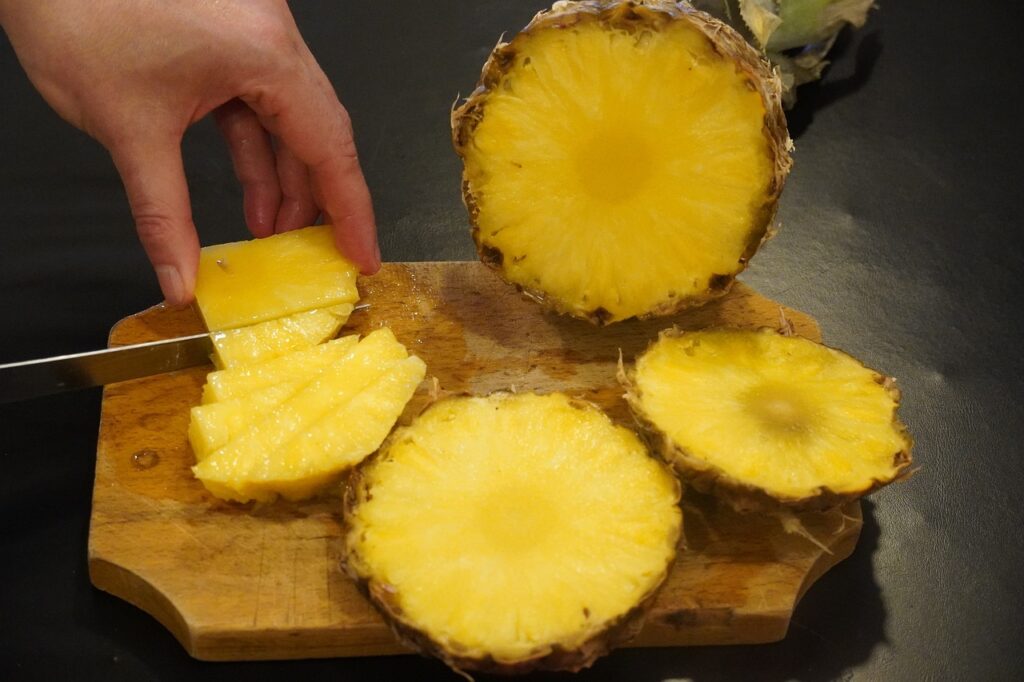Nutritional Benefits of Pineapple for Baby’s Growth

When it comes to introducing your little one to solid foods, it’s essential to choose nutrient-rich options that support their growth and development. With its sweet and tangy flavor, pineapple can be a delightful addition to your baby’s diet. You can also read the “can babies eat pineapple parent.guide” to learn more about pineapples for babies. In this article, we’ll explore the nutritional benefits of pineapple and how it can contribute to your baby’s healthy growth.
Vitamins and Minerals
Pineapple is a nutritional powerhouse, rich in essential vitamins and minerals vital for your baby’s development. Some of the key nutrients found in pineapple include:
- Vitamin C: Pineapple is loaded with vitamin C, crucial for your baby’s immune system, skin health, and iron absorption from other foods.
- Vitamin B6: This vitamin plays a role in brain development and the production of neurotransmitters, contributing to cognitive growth.
- Folate: Folate, or vitamin B9, supports cell division and DNA formation, making it essential for growth and development.
Fiber for Digestive Health
Pineapple contains dietary fiber, which promotes healthy digestion in your baby. A fiber-rich diet helps prevent constipation, a common concern for many infants transitioning to solid foods. Additionally, fiber-rich foods can aid in the absorption of nutrients and promote a healthy gut microbiome.
Natural Enzymes
Pineapple contains bromelain, a group of natural enzymes with potential health benefits. While more research is needed to understand its exact effects on babies, bromelain is believed to aid digestion and reduce inflammation, which can benefit overall well-being.

Hydration
Pineapple has a high water content, contributing to your baby’s hydration. Proper hydration is essential for all bodily functions and supports your baby’s overall growth and development. Incorporating pineapple into your baby’s diet can be a tasty and refreshing way to keep them hydrated.
Antioxidant Properties
Pineapple contains antioxidants like beta-carotene, which help protect your baby’s cells from damage caused by free radicals. These antioxidants contribute to overall health and can support your baby’s growing immune system.
Introduction to New Flavors
Introducing diverse flavors early in your baby’s solid food journey can help expand their palate and encourage them to enjoy a variety of foods as they grow. Pineapple’s unique taste adds diversity to your baby’s diet. Plus, its texture makes it an easy fruit to introduce as a puree or in small soft pieces. Also, its sweetness may make it more appealing to your baby’s taste buds.

Precautions When Introducing Pineapple to Your Baby
While pineapple offers many nutritional benefits, it’s essential to introduce it with care:
- Age-Appropriate: Introduce pineapple when your baby is ready for solids, usually around six months. Ensure it is properly pureed or mashed to prevent choking hazards.
- Allergies: Monitor your baby for any signs of allergies, such as hives, rash, or gastrointestinal discomfort, when introducing pineapple or any new food.
- Acidity: Pineapple is naturally acidic, which may be harsh on your baby’s stomach. Start with small amounts and observe how your baby reacts.
- Texture: Ensure the pineapple is prepared to a texture suitable for your baby’s age and developmental stage. Purees are ideal for beginners, while older babies can handle small, soft chunks.
In Conclusion
Pineapple can be a delightful and nutritious addition to your baby’s diet, offering essential vitamins, minerals, fiber, and hydration. As you embark on the journey of …

